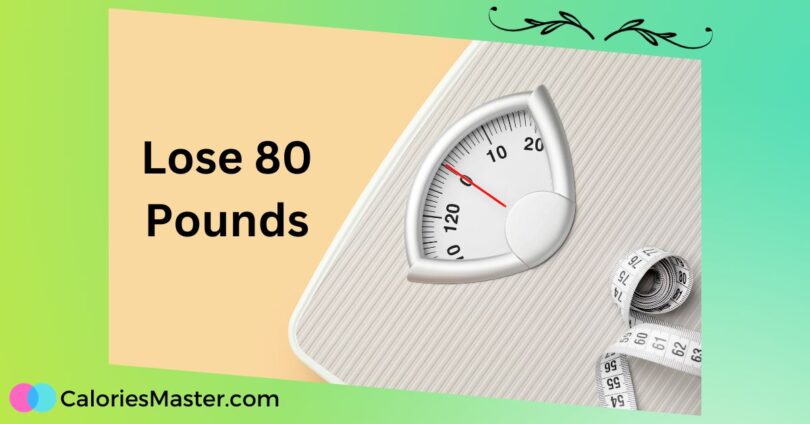Losing weight can be a challenging process, especially when trying to shed a significant amount of weight such as 80 pounds. Many people may wonder how fast they can lose 80 pounds and what steps they need to take to achieve their weight loss goals.
The answer to how fast someone can lose 80 pounds varies depending on various factors such as age, gender, starting weight, and activity level.
However, it’s important to note that healthy weight loss is typically considered to be around 1-2 pounds per week. This means that it could take anywhere from 40-80 weeks, or 10-20 months, to lose 80 pounds healthily and sustainably.
To achieve significant weight loss, it’s essential to adopt a healthy and balanced diet, increase physical activity, and make lifestyle changes that promote overall health and well-being.
This article will explore various strategies and tips for losing 80 pounds healthily and sustainably, as well as the potential risks and challenges associated with rapid weight loss.
How Fast Can I Realistically Lose 80 Pounds? – Understanding Weight Loss
Let’s understand weight loss first:
Calories and Deficit
Losing weight is a process that requires a caloric deficit, which means consuming fewer calories than the body burns. It is important to note that one pound of body fat is equivalent to 3,500 calories. Therefore, to lose one pound of fat per week, one must create a deficit of 500 calories per day.
Creating a caloric deficit can be achieved through a combination of diet and exercise. For example, reducing calorie intake by 250 calories per day and burning an additional 250 calories through exercise can create a deficit of 500 calories per day, resulting in a weight loss of one pound per week.
Role of Metabolism
Metabolism plays a significant role in weight loss. It is the process by which the body converts food into energy. The rate of metabolism varies from person to person and is influenced by several factors, including age, gender, body composition, and activity level.
A higher metabolism means the body burns more calories at rest, which can aid in weight loss. However, it is important to note that metabolism slows down as people age, which can make it more challenging to lose weight.
In conclusion, losing 80 pounds is a significant weight loss goal that requires a caloric deficit and an understanding of the role of metabolism. By creating a deficit of 500-1000 calories per day through diet and exercise, it is possible to lose 1-2 pounds per week.
Healthy Weight Loss Strategies
Losing 80 pounds can seem like a daunting task, but with the right strategies in place, it is achievable. Here are some healthy weight loss strategies to help you reach your goal.
Dietary Changes
Making dietary changes is a crucial part of any weight loss plan. It is important to focus on consuming nutrient-dense foods that provide your body with the necessary vitamins and minerals.
Eating a well-balanced diet that includes a variety of fruits, vegetables, whole grains, lean proteins, and healthy fats can help you healthily lose weight.
In addition to focusing on nutrient-dense foods, it is also important to pay attention to portion sizes. Using smaller plates, measuring your food, and being mindful of your hunger and fullness cues can help you avoid overeating.
Exercise Regimen
Regular exercise is another important component of a healthy weight loss plan. It is recommended to engage in at least 150 minutes of moderate-intensity exercise or 75 minutes of vigorous-intensity exercise per week. This can include activities such as brisk walking, cycling, swimming, or strength training.
Incorporating physical activity into your daily routine can also help you burn extra calories. Taking the stairs instead of the elevator, going for a walk during your lunch break, or doing a quick workout at home can all help you increase your daily activity levels.
Lifestyle Adjustments
In addition to dietary changes and regular exercise, making lifestyle adjustments can also help you lose weight. Getting enough sleep, managing stress levels, and staying hydrated are all important factors to consider.
Getting enough sleep can help regulate your appetite hormones and reduce cravings for unhealthy foods. Managing stress levels can help prevent emotional eating and reduce the risk of weight gain. Staying hydrated can help you feel fuller and reduce the risk of overeating.
By implementing these healthy weight loss strategies, you can lose 80 pounds safely and sustainably. Remember to always consult with a healthcare professional before starting any weight loss plan.
Setting Realistic Goals
Losing 80 pounds is a significant weight loss goal that requires a lot of hard work and dedication. However, it is essential to set realistic goals to ensure that you do not get discouraged and give up halfway through your weight loss journey. Here are some tips to help you set realistic goals:
Time Frame Expectations
It is crucial to understand that losing 80 pounds in a short period is not healthy or realistic. A safe and healthy weight loss rate is 1-2 pounds per week. Therefore, it would take approximately 40-80 weeks or 10-20 months to lose 80 pounds. Setting a realistic timeline will help you stay motivated and on track.
Milestone Planning
Breaking down your weight loss goal into smaller milestones can help you stay focused and motivated. For instance, you can aim to lose 10 pounds in the first month, 20 pounds in the second month, and so on. Celebrating your milestones can help you stay motivated and give you a sense of accomplishment.
Here are some tips to help you plan your milestones:
- Set specific and achievable goals
- Write down your goals and track your progress
- Celebrate your milestones with non-food rewards such as buying new clothes or treating yourself to a spa day.
In summary, setting realistic goals is essential for achieving long-term weight loss success. By setting a realistic timeline and breaking down your weight loss goal into smaller milestones, you can stay motivated and on track.
Potential Risks and Considerations
Here are the potential risks and considerations associated with losing 80 pounds.
Rapid Weight Loss Dangers
Losing 80 pounds quickly may seem like a tempting goal, but it can come with several potential risks. Rapid weight loss can lead to a loss of muscle mass, which can slow down the metabolism and make it harder to maintain weight loss in the long term.
Additionally, rapid weight loss can cause gallstones, dehydration, electrolyte imbalances, and nutrient deficiencies.
It is important to note that losing weight too quickly can also increase the risk of developing gallstones, which are solid deposits that can form in the gallbladder. Rapid weight loss can also lead to dehydration and electrolyte imbalances, which can cause fatigue, dizziness, and muscle cramps.
Consulting Healthcare Professionals
Before embarking on any weight loss journey, it is important to consult with a healthcare professional. They can guide safe and effective weight loss strategies that take into account your individual health needs and medical history.
In some cases, healthcare professionals may recommend a slower rate of weight loss to reduce the risk of potential health complications. They may also recommend incorporating exercise and a balanced diet to promote sustainable weight loss and overall health.
Overall, while losing 80 pounds may seem like a daunting task, it is important to approach weight loss safely and sustainably.
By consulting with healthcare professionals and prioritizing a balanced approach to weight loss, individuals can achieve their weight loss goals while minimizing potential risks and complications.









